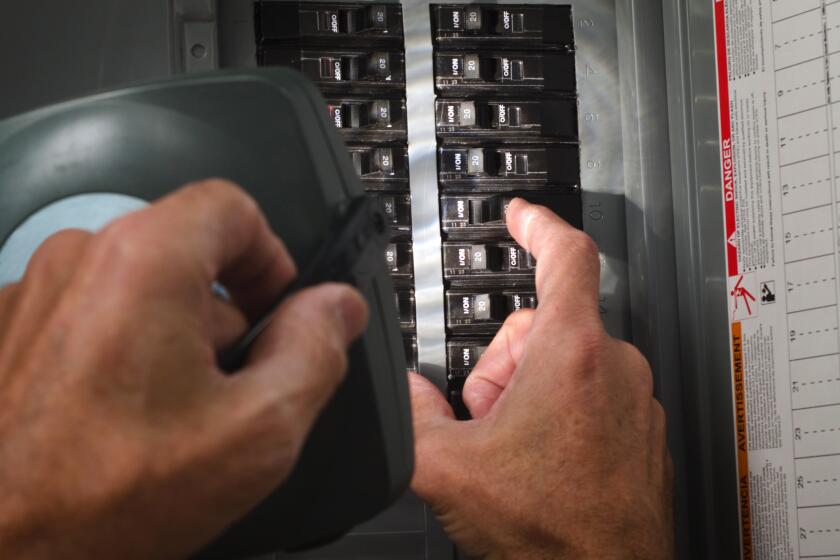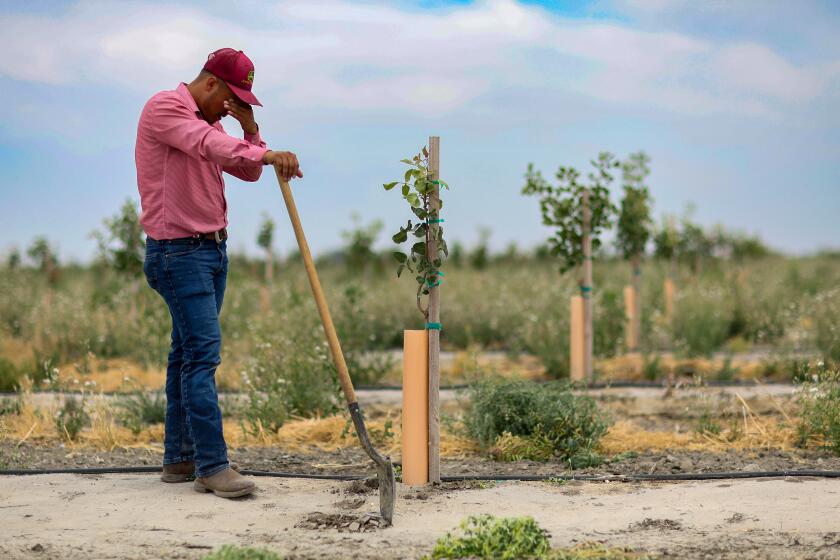News of Mine Blast Brings Panic, Then Relief to San Diego Families
Carolyn Olson had put on silk pajamas and snuggled beneath her electric blanket to watch the news when she got a call saying that the assault ship Tripoli, which carried her husband, had hit a mine in the Persian Gulf.
Olson and others with family members aboard the San Diego-based ship were first told there were two missing and four injured. Olson, whose mother died three months ago, was so stunned that she hung up the phone, thought a few moments, and then called back the ship’s ombudsman to make sure she had not been joking.
When Olson realized it was true, she panicked. “How could God take my mother away and the only other person I love, my husband?” she cried. “Why is the Lord so mean?”
The Tripoli, an amphibious helicopter assault carrier, was leading a minesweeping mission when it hit a floating mine that exploded and gouged a 16-by-25-foot hole in the ship’s hull, about 10 feet below the waterline. One man suffered a broken collarbone, another had a concussion, and two others were treated for minor cuts and bruises. A second ship, the guided-missile cruiser Princeton, based in Long Beach, was also slightly damaged by an influence mine, one that explodes without contact.
The Princeton went to a Persian Gulf port for inspection Tuesday. The Tripoli’s crew patched the hull, and the ship remained on station.
Three men were injured aboard the Princeton, one seriously. Jackie Hontz, wife of Capt. Edward B. Hontz of the Princeton, was notified two hours later by a commanding admiral and promptly activated a “phone tree” alerting families of Princeton’s men.
Hontz said she talked to the wife of the most seriously hurt man, a petty officer who suffered a head injury. “She was very concerned and nervous. Some other wives and the chaplain have gone to see her. I think she’s all right,” Hontz said. The names of the injured men have not been released.
For a hellish few hours until they learned that no one had been killed, Olson and other wives in San Diego speculated that it might be their husbands who were missing, perhaps blown to pieces. They tried to imagine where their husbands would be on the ship at the time of the blast, 4:20 a.m. Were they in the upper decks and safe? Or were they below?
Word of the incident tore through the community of wives and families Sunday. The system of phone trees, set up so families are contacted in such cases, kicked into gear. One wife called seven others, who in turn called others. In little time, most families knew and anxiously waited to learn more.
Olson’s husband, Warren, who has been in the Navy 13 years, works below sea level in the boiler room. For the first time in their two-year marriage, she said, she had the sense that he was trying to relay a message to her.
“I could feel him saying, ‘Honey, I’m OK, I’m OK. Don’t worry,’ ” said the 36-year-old, her panic began to ebb.
For Olson and the others, it was the second terrifying mishap to befall the ship. In December, as the vessel sailed to the Gulf, a helicopter attached to the Tripoli crashed into the north Pacific Ocean, killing four. That accident occurred at the same time that Kimberly Carter’s husband was scheduled to fly in a helicopter.
Carter, 28, president of a wives’ support group, was bowling Sunday night when she got a call saying that, once again, misfortune had struck the ship. When Carter returned to her bowling team, they gently suggested she go home. But Carter, knowing her husband was located on the upper decks of the vessel, was certain he was safe.
She stayed at the lanes, saying: “What do you want me to do, sit home alone and cry?”
There, at the bowling alley, she got six calls. With each, she got increasing bits of information and reassurance. After she returned home, she saw her husband, Joseph, a 33-year-old damage control chief, on television, issuing orders to his men. She knew then that he was safe.
Carter, who has been married for six years and served in the Navy for two years, approaches this deployment like an old hand.
But for others, such as Olson or Faye Alvarado, whose husbands had never been away from home during a deployment, the assignment to a war zone was a double blow. Not only did they have to adjust to their husbands’ absence; they also had to contemplate the possibility that they might not return.
Alvarado had been married two weeks when her husband abruptly departed for the Persian Gulf. The Tripoli was one of a 13-ship task force that departed San Diego and Long Beach on Dec. 1. Before meeting her husband, Robert, a 27-year-old boiler technician, she didn’t know any sailors and she knew nothing about ships.
“I am learning about ships the hard way,” sighed Alvarado, 31.
More to Read
Sign up for Essential California
The most important California stories and recommendations in your inbox every morning.
You may occasionally receive promotional content from the Los Angeles Times.






